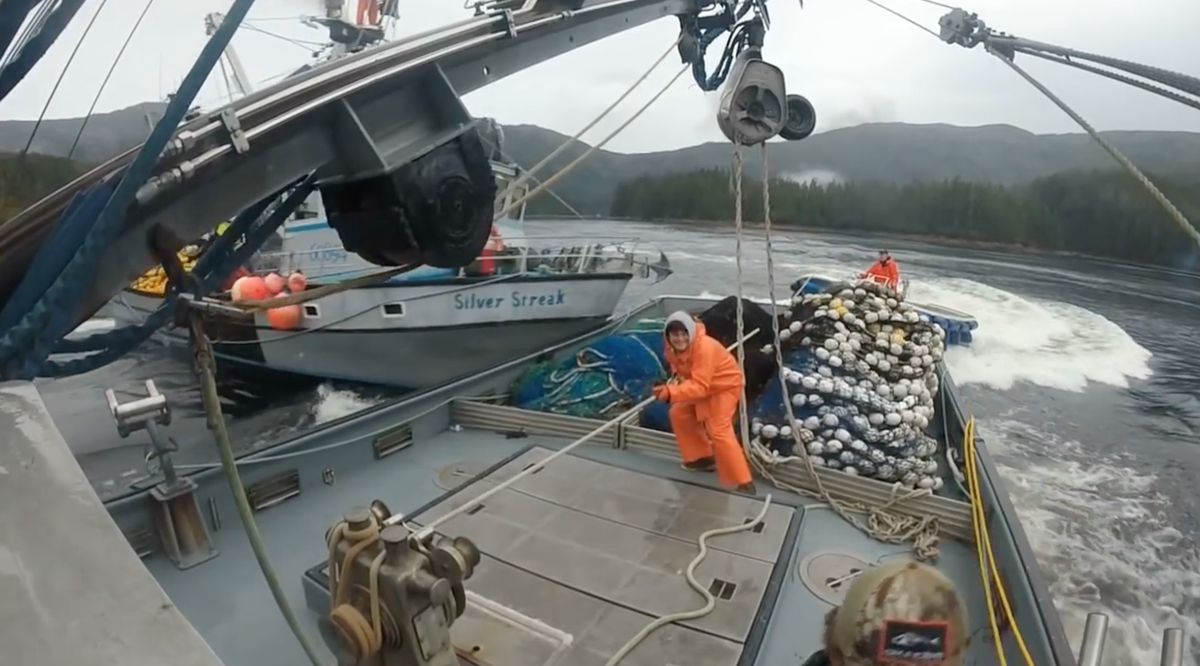It was the gap-shot heard ’round the fishing world. In August 2016, three Alaska seiners were involved in a serious collision that by stroke of luck did not include charges of murder or manslaughter. A plea deal in the case late last week brings an end to more than a year of hearings.
Kami Cabana, a third-generation Alaska fisherman at the helm of the Chugach Pearl, faced first-degree felony assault charges for "intentionally ramming" Jason Long on the aptly named Temptation in Prince William Sound’s Hidden Bay.
Long, who was then based in Cordova, was on the outside looking in. As he buzzed around a ring of seiners who had arrived days before to wait for the opening, he saw an opening of his own — an opportunity to squeak through and set on a school of pink salmon. He tried to shoot the gap between the Chugach Pearl and the Silver Streak.
The resulting impact collapsed the Temptation’s stack and sent it crashing onto a deckhand. He was medevaced and has faced a long recovery for his injuries, including a concussion.
By all accounts, the operators of the Chugach Pearl and Silver Streak had been teaming up to close the gap that the Temptation, purse skiff in tow, was on course to shoot through.
The Coast Guard determined that Cabana never stopped forward motion as she closed the gap, while the Silver Streak captain went into reverse, according to an October 2017 filing. The report also determined that the Temptation "dramatically increased its speed" about 12 seconds before the collision and never slowed.
The Coast Guard decided that the captains of both the Chugach Pearl and the Temptation were in the wrong. But what the case really dredges up is an age-old debate over access to fishing grounds. Does a family with generations of history in a fishery take precedent over a newcomer, even if they both carry legal permits? If so, how far can a fisherman reasonably go to defend their territory?
The case was filed in April 2017, but Long’s GoPro footage of the collision appeared on YouTube this year and hoisted the case into the court of public opinion.
&feature=youtu.beAlaska blogger Craig Medred called it “not just another Alaska yelling [match] about who gets to catch what,” but that’s exactly what it is.
Cabana's family is based in Girdwood, Alaska, and has fished the area for more than 50 years. Her father, Tim, has handed down the fishing operations to his daughter while he works on building a brewery in town.
Long showed up on the Temptation several days after the Cabana fleet of family and friends arrived to wait for the opening. He was being edged out because the early birds were working together to block the competition — or maintain their own access, depending on who you ask.
To top it off, 2016 was a disastrous year for pink salmon returns. The early predictions for a low return of 41 million fish resulted in a catch of less than 9 million. Tensions were high before anyone set foot on deck that summer, and they increased as the summer wore on.
So who is at fault? By the rules of the road, both captains were in the wrong. Both vessel operators should have taken measures to avoid collision. However, Cabana and her cohort on the Silver Streak initiated the incident with a dangerous move that, again, could have involved a murder charge. Long took a calculated but legal risk and then failed to react appropriately when his calculation failed. Cabana’s action was illegal from the get-go, also risky and also (poorly) calculated.
By the implied rules of commercial fishing, again, both were wrong but by varying degrees. Showing up late and as a relative newcomer grants you access to the fish. But no one is going to roll out the red carpet in a competitive fishery. By the same token, showing up with history and a posse does not grant you the right to ram your competition. Working to maintain your own access and protect your gear is part of the deal. Charging down other boats is not.
Under the terms of the deal, Cabana agreed to plead guilty to a misdemeanor of reckless endangerment, pay restitution to the injured crewman, serve 120 hours of community service and complete a Coast Guard boating course. She has reportedly fulfilled her service and taken the course. The parties also reached a deal in a civil case last year. The amount of restitution is to be determined.
Long has reportedly sold his boat and moved his family to Port Angeles, Wash. His $1,300 fine from the Coast Guard is in the appeals process. Cabana’s attorney, Patrick Bergt, said that she’s paid a price in online harassment and threats, as well as a new effort to avoid confrontation.
In handing down a slap on the wrist for Cabana, the state of Alaska has left a wide opening for the tolerance of vigilante fishing.







